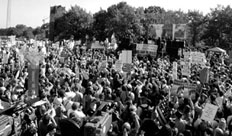Amid global protests, thousands of anti-war activists march to White House
International A.N.S.W.E.R. (Act Now to Stop War & End Racism)

WASHINGTON–More than 150,000 anti-war demonstrators marched around the White House Oct. 26 to protest President George W. Bush’s plans to wage war on Iraq.
Similar marches were held on the same day all around the world. More than 50,000 turned out at San Francisco’s City Hall, while thousands more marched in Augusta, Maine and Chicago, Ill. In Amsterdam, more than 4,000 demonstrated despite heavy rain there, while in Berlin 10,000 turned out. Other demonstrations were held in Frankfort and 70 other cities in Germany; Copenhagen, Stockholm, Rome, Tokyo, and Mexico City, according to published reports.
Marchers here chanting familiar anti-war slogans: “George Bush, you can’t hide. We charge you with genocide,” “1-2-3-4, we don’t want your racist war,” and “What do we want? Peace! When do we want it? Now!”
Others beat drums. Many carried signs such as: “Regime Change Begins at Home: Vote,” “No More Blood for Oil,” and “Drop Bush not Bombs.”
After hearing from speakers including Rep. Cynthia McKinney (D-Ga.), former U.S. Attorney General Ramsey Clark, the Revs. Jesse Jackson and Al Sharpton, actress Susan Sarandon, and singer Patti Smith, the orderly procession walked shoulder-to-shoulder, as wide as a boulevard around the executive mansion.
Rep. McKinney, who voted along with 132 other House members Oct. 10 against the resolution which authorized the president to use force against Iraq, has been outspoken in her criticism against unilateral U.S. war plans, calling reports of Iraqi President Saddam Hussein’s chemical and biological weapons “exaggerated.”
“Where were you when your country needed you?” Ms. McKinney asked rhetorically, naming Mr. Bush, Defense Secretary Donald Rumsfeld and several other prominent conservative war-hawks who have spotty military records themselves, or who avoided military service altogether during the Vietnam era.
“This is going to be an unnecessary fight. Most of the world is saying ‘no’ to it. If we launch a pre-emptive strike on Iraq, we lose all moral authority,” the Rev. Jackson told the pre-march rally. “How will we say no to India, to Pakistan, to China when they consider pre-emptive strikes?
“Saddam Hussein should be held accountable for his crimes. That’s a good argument for the International Criminal Court, not a good argument for bombing Baghdad. We must have a higher order than a one-bullet diplomacy,” the Rev. Jackson continued.
Any U.S. military effort against Iraq would be an attempt by the Bush administration to “rule the world,” said Mr. Jackson. Launching a war against Iraq would “destabilize the Persian Gulf; leave the whole world in danger and invite more violence here into our own country.
“We must be a leader of the world, not a ruler of the world,” the Rev. Jackson said.
The Bush administration is the guilty party, argued former Attorney General Clark. He accused the U.S. of waging war crimes against Iraq. “We are killing a million and a half people through genocidal sanctions,” he said. “We are destroying international law, destroying the UN, destroying the Constitution, the Bill of Rights,” said Mr. Clark.
After nearly two hours, when the first demonstrators returned to the starting point of an expanded march route around the Ellipse, the White House and Lafayette Square, they had to wait to allow the last of the protestors to begin their trek. Mr. Bush was not at home, however. He and First Lady Laura Bush were traveling from their Texas Ranch to Cabo San Lucas, Mexico where the president attended the Asian-Pacific Economic Cooperation forum.
Protestors included young and old, veterans, religious leaders–including thousands of Muslims and Arabs–environmental activists, and anti-capitalists. Many waved Palestinian flags and carried signs denouncing U.S. support for Israel. They argued that Mr. Bush’s claims that the U.S. public overwhelmingly supports him are exaggerated.
“This is not about weapons of mass destruction. This is about oil!” declared organizer Mahdi Bray, executive director of the Muslim American Society Freedom Foundation.
Mr. Bush would never pursue the use of military force against North Korea, which has publicly admitted it possesses atomic weapons, because the Asian nation is not capable of supporting America’s “addiction” to oil, said Mr. Bray.
Iraq has the world’s second largest proven oil reserves. Arab states in the Persian Gulf region control two-thirds of the known oil reserves, said war opponents.
This march was the largest anti-war mobilization since 1970s protests against the Vietnam War according to the International A.N.S.W.E.R. Coalition (Act Now to Stop War End Racism). Their claims were supported by law enforcement authorities who did not offer their own official crowd estimates, but who did not dispute coalition claims.
The protest was much larger than the 75,000 who turned out here in support of Palestinian rights last April, and it was larger than the 75,000 in 1991 who protested at the height of the Persian Gulf War.
Unlike previous anti-war protests, organizers point to the fact that this demonstration occurred even before the conflict began, before one shot has been fired, rather than at the height of the bloodletting as in past marches. Many march supporters interpret that as a sign of a potentially powerful movement should hostilities erupt.












